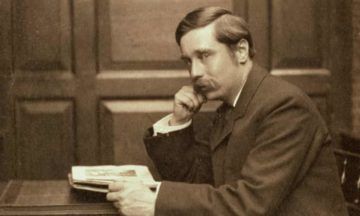Elif Shafak in The Guardian:
 In his writings, Wells conveyed a plethora of futuristic prophecies, from space travel to genetic engineering, from the atomic bomb to the world wide web. There was no other fiction writer who saw into the future of humankind as clearly and boldly as he did.
In his writings, Wells conveyed a plethora of futuristic prophecies, from space travel to genetic engineering, from the atomic bomb to the world wide web. There was no other fiction writer who saw into the future of humankind as clearly and boldly as he did.
Were he to have been alive at the very end of the 20th century, what would he have made of that world? I am especially curious to know what he would have thought about the unbridled optimism characteristic of the era, an optimism shared by liberal politicians, political scientists and Silicon Valley alike. The rosy conviction that western democracy had triumphed once and for all and that, thanks to the proliferation of digital technologies, the whole world would, sooner or later, become one big democratic global village. The naive expectation that, if you could only spread information freely beyond borders, people would become informed citizens, and thus make the right choices at the right time. If history is by definition linear and progressive – if there is no viable alternative to liberal democracy – why should you worry about the future of human rights, or rule of law, or freedom of speech or media diversity? The western world was regarded as safe, solid, stable. Democracy, once achieved, could not be disintegrated. How could anyone who had tasted the freedoms of democracy ever agree to discard it to the winds?
Fast forward, and today this dualistic way of seeing the world is shattered. The ground beneath our feet does not feel that solid any more. We have entered the Age of Angst. Ours is the age of pessimism. Ours is a world that is hurting. If Wells were alive today, what would he think of this new century with its increasing polarisation, rising populist authoritarianism, and the bewildering pace of consumption – including consumption of misinformation – all of which are exacerbated by digital technologies?
More here.
